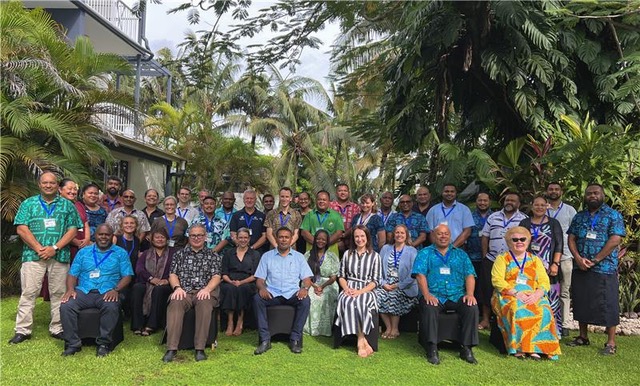
by Ednal Palmer
The Climate and Oceans Support Program in the Pacific (COSPPac) annual general meeting has started in Honiara today with a call to secure continued funding and support for COSPac.
Speaking to officially open the meeting, on behalf of the Solomon Islands government, Permanent Secretary (supervising) of the Ministry of Environment, Climate Change, Disaster Management, and Meteorology (MECDM), Karl Kuper said Investment in climate and ocean tools, especially those that are inclusive and reach even our most remote communities, remains essential.
“COSPPac’s role in building technical capacity and strengthening national systems cannot be overstated. Let us work together to ensure that this momentum is not only maintained, but expanded,” Kuper stated.
He applauded “the pivotal role COSPPac continues to play in enhancing the delivery of climate and ocean services — particularly for countries like the Solomon Islands”.
“The products and tools developed through this partnership, such as Malaclim — unique in our region, EAR Watch, and the Ocean Outlook, have become invaluable to our government’s decision-making and to the lives of our communities.”
Chairman of Pacific Meteorological Council (PMC) Levu Boaz Antafalo of Vanuatu, also commended COSPPac as a flagship climate initiative in the region.
“The services developed under COSPPac are foundational — from basic data archiving to today’s sub-seasonal and seasonal climate products, now being delivered to sectors and communities for decision-making.
“Speaking from the experience of Vanuatu Meteorology and Geo-Hazards Department, COSPPac has allowed us to scale our capabilities and strengthen how we serve our people.”
In a program of four years from 2023 to 2027, COSPPAC Phase 3 (COSPPac3) looks to the development path of the Pacific National Meteorological and Hydrological Services (NMHSs) and Land and Survey Departments to enable them to deliver climate and ocean information services, in partnership with their priority stakeholders, that are useful to, and used by government, businesses and communities (including women, people with disabilities and other marginalised groups).
These services will ensure that Pacific Island stakeholders continue to build their resilience to the impacts of climate change and disasters so that they are able to lead safe, secure, and prosperous lives.
COSPPac is funded by the Australian Government Department of Foreign Affairs and Trade (DFAT) and the New Zealand Government’s Ministry of Foreign Affairs and Trade (MFAT).
Speaking during the opening ceremony this morning, Lindsay Buckingham, Minister Counsellor of the Australian High Commissio, said many countries in the Pacific are at the forefront of climate impacts and Australia recognises that making the transition to low-emission and climate-resilient economies requires an injection of financing.
“That is why Australia is strengthening its climate financing globally, including most recently a S100 million foundational commitment to the Pacific-led Pacific Resilience Facility.”
New Zealand High Commissioner to the Solomon Islands Jonathon Curr, New Zealand is pleased to see COSPPac continue to deliver high-value information services that enable informed decision making across the region, from national planning to community action.
NZ remains enthusiastic about COSPPac’s future and remains a committed partner in ensuring the program continues to deliver lasting value for Pacific peoples.
The five-day event brings together key stakeholders, technical partners, and representatives from across the Pacific to review the program’s progress, share experiences, and plan future strategies aimed at building resilient and well-informed communities in the region.
Participants include Steering Committee members such as Directors of National Meteorological and Hydrological Services (NMHS), representatives from the Pacific Geospatial and Surveying Council (PGSC), Pacific Disability Forum, and donor partners from the Australian Department of Foreign Affairs and Trade (DFAT) and New Zealand Ministry of Foreign Affairs and Trade (MFAT).
Program delivery partners, including the Pacific Community (SPC), Secretariat of the Pacific Regional Environment Programme (SPREP), Bureau of Meteorology Australia, National Institute of Water and Atmospheric Research (NIWA), and Geoscience Australia, are also present.
The meeting will highlight COSPPac’s achievements over the past year, identify challenges faced and share lessons learned, and strengthen regional partnerships in delivering effective and inclusive climate and ocean science services.
The 2025 COSPPac3 annual meeting will run over 5 days – two days for cross-cutting integration, two days for Annual Program Performance Review and Planning, and one day for the Steering Committee Meeting.
The meeting will end on the 16th May.

